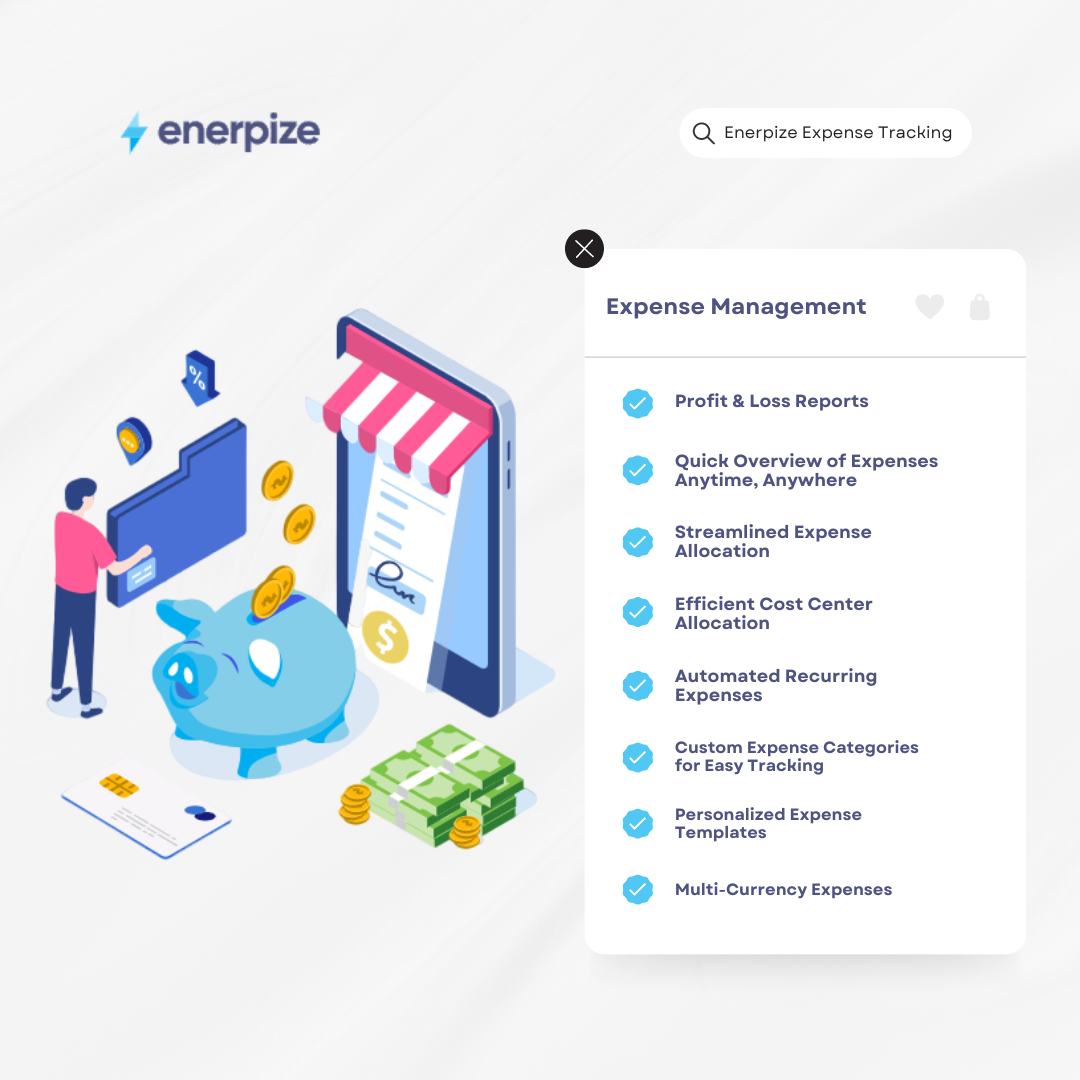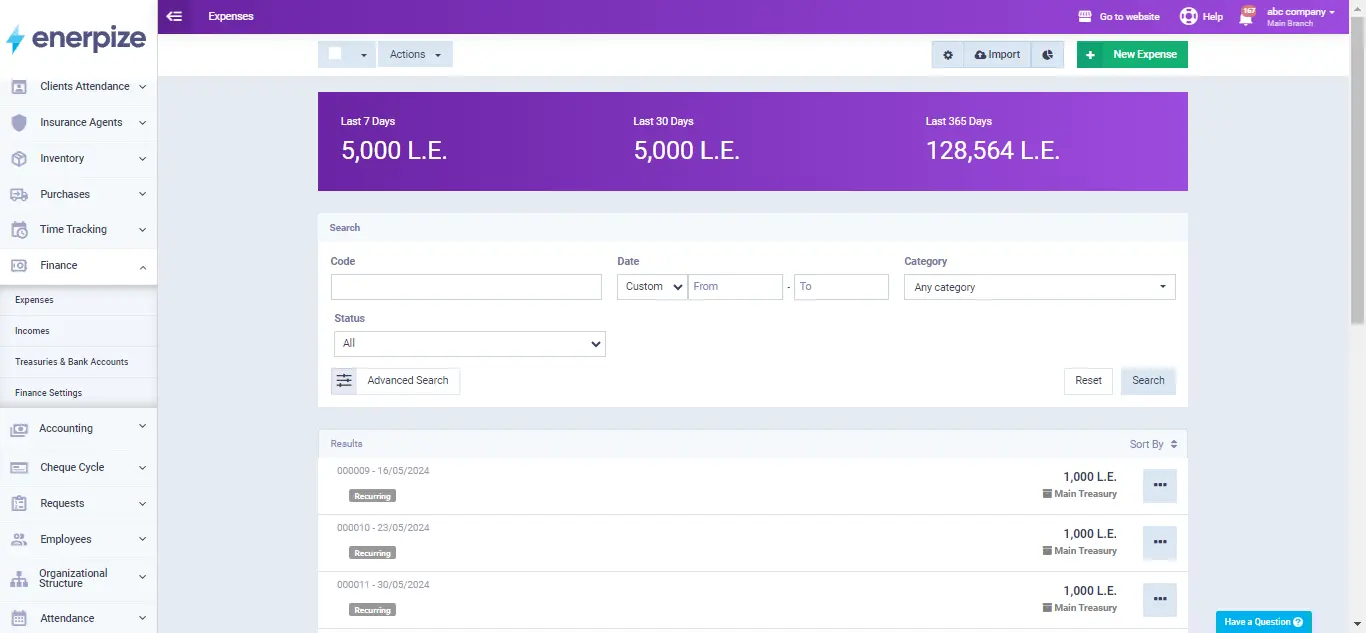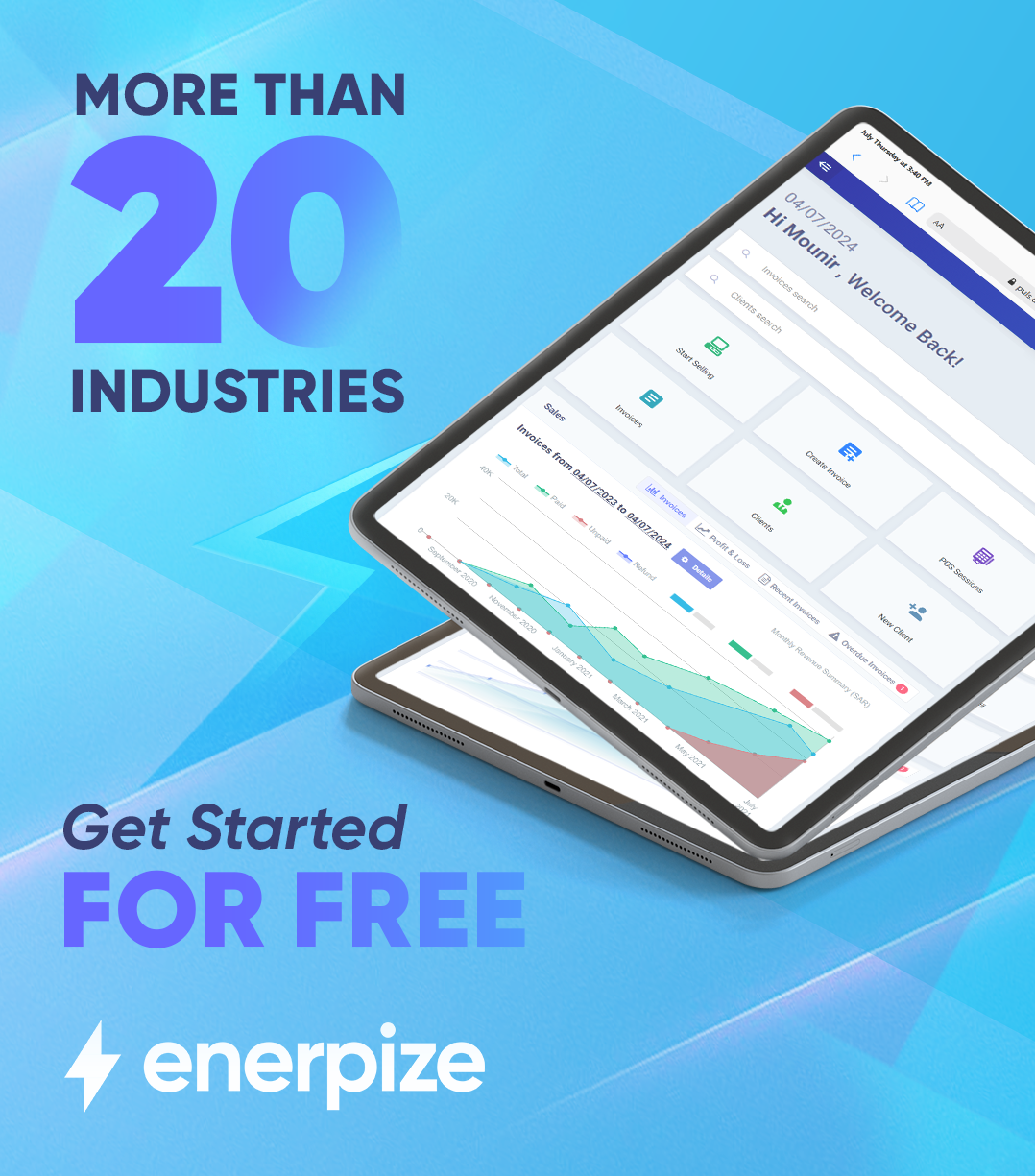Create and send online quotations and invoices, track sales, monitor staff performance, and sell & sync all your products via our POS and more.
Author : Haya Assem
Reviewed By : Enerpize Team
How To Track Business Expenses: A Comprehensive Guide

Table of contents:
- Key Takeaways
- What is Tracking Business Expenses?
- 6 Reasons Why You Need to Track Business Expenses
- How to Keep Track of Business Expenses Effectively
- Why You Need To Use Apps to Track Business Expenses
- Importance of Expense Tracking Apps
- How Enerpize is The Best Way To Track Business Expenses
- FAQs About Tracking Business Expenses
Tracking expenses is the backbone of financial stability and the formulation of an efficient budget, whether for an individual, a small business, or a large organization. Keeping track of regular expenditures helps you stay on top of your cash flow. Beyond mere budgeting, expense tracking enables individuals and businesses to make informed financial decisions, figure out potential savings, and gain a comprehensive understanding of their financial situation.
Technology has intervened to enhance the process of expense tracking, making it seamless and more accurate. It has developed expense-tracking apps that boast an almost negligible margin of error compared to manually undertaking this process. This is done to eliminate the possibility of human error to ensure precision and reliability.
Key Takeaways
- Expense tracking involves recording a company's spending, encompassing employee benefits, utilities, office expenses, supplies, depreciation, maintenance, and repairs. Small businesses track fixed and variable costs, emphasizing the importance of monitoring irregular and unpredictable expenses.
- Effective business finance involves strategic elements: managing cash flow, preparing for taxes by tracking expenses, determining profitability, identifying strengths/weaknesses, enhancing decision-making, and setting/tracking financial goals for success and performance evaluation.
- Effectively manage business expenses by setting up a separate account, using accounting software, linking to your bank account, filing receipts systematically, regularly reviewing expenses, and constructing clear purchasing processes for efficiency, cost control, and accountability.
- Expense-tracking apps aid individuals and businesses in systematically recording, categorizing, and analyzing financial transactions. Users input data manually, categorize expenditures, generate reports, utilize cloud sync, integrate with other tools, and prioritize security measures.
- Enerpize facilitates effective financial management by offering customizable accounts, categorized expenses, and streamlined payment handling. It provides detailed reports, including Profit and Loss, offers quick expense overviews, allows efficient allocation, automates recurring expenses, and supports multi-currency management.
What is Tracking Business Expenses?
Expense tracking is the process of keeping records of a company's spending, including employee benefits, utility costs, office expenses, and supplies, as well as depreciation, maintenance, and repairs. It is an important aspect of creating an effective budget since it includes tracking regular expenditures such as receipts, invoices, and other outgoing items.
For small businesses, the process remains constant, but expense records may include both fixed expenses like rent and utilities and variable costs like labor, product orders, and marketing. It is critical to carefully track irregular and unpredictable expenses, as these are not typically included in the initial budget.
Read Also: Lease Accounting Journal Entries: Types, Standards & Calculating Steps
6 Reasons Why You Need to Track Business Expenses
Effective business finance management requires a strategic approach that includes key elements such as cash flow management, tax preparation, profitability determination, identifying strengths and weaknesses, improving decision-making capabilities, and setting/tracking financial goals.
Stay on Top of your Cash Flow
Cash flow is the total amount of money that flows in and out of a business, and your major business aim should be to keep more cash in than out to avoid falling into the trap of cash loss or having more cash out than in, which will eventually lead to business failure.
To avoid slipping into this trap, you must keep a watchful check on your expenses and implement effective cash flow management strategies. Monitoring your cash flow involves regularly reviewing your income and expenditures, identifying patterns, and making informed decisions to optimize your financial health.
Be Prepared for the Tax Season
Regularly tracking your expenses will help you to seamlessly determine the amount of taxes you owe so that you don’t face the yearly tax season issues. Maintaining accurate and organized financial records enables you to easily identify deductible expenses, reducing your taxable income and lowering your overall tax liability.
Determine your Business Profitability
Expense tracking is critical for determining and improving business profitability. It helps businesses control and reduce costs, calculate profit margins, create accurate budgets, and forecast future expenses. Furthermore, it aids in assessing operational efficiency, informed decision-making, and the ability of firms to adapt to changing market conditions.
Identify your Business Strengths and Weaknesses
Identifying your business's strengths and weaknesses is a critical phase in promoting long-term growth and competitiveness. Conducting analysis enables you to identify and leverage your company's strengths, such as product offers, customer service, and operational efficiency. Simultaneously, analyzing weaknesses helps identify opportunities for progress, allowing you to adopt strategic actions to overcome inefficiencies or deficiencies.
Enhance Decision-Making Capabilities
Tracking expenses offers real-time updates on business finances, facilitating informed decision-making based on recorded expenses. This practice provides insights into financial health and helps identify spending patterns, allowing for strategic adjustments, efficient resource allocation, and adherence to budget constraints.
Set and Track Your Financial Goals
Expense tracking is critical for setting and tracking a business's financial objectives. It allows you to create realistic budgets, identify cost-cutting options, and analyze the revenue-to-expense ratio. Tracked expenses serve as metrics for performance, helping to develop benchmarks and key performance indicators for evaluating progress.
Read Also: Prepaid Expense Journal Entries: Importance, Examples & How to Record?
How to Keep Track of Business Expenses Effectively
Effectively managing and tracking business expenses is crucial for the financial health of any enterprise. It ensures that you have a clear understanding of where your money is going, helps in budgeting, and simplifies tax compliance. We'll outline six essential steps to help you streamline the process and keep a tight grip on your business expenses.

Set Up a Separate Business Account
Creating a separate business account is an important step for organizations. It enables legal compliance, financial transparency, and precise tracking of corporate transactions. This practice will promote financial clarity and help in monitoring cash flow, making it easier to identify business-related expenses and income.
Choose Accounting Software
To be able to digitize all of your paperwork, you must integrate your business with accounting software. Accounting software automates your business records and tracks each expense, categorizes your business expenses, and tracks your finances more effectively, allowing everyone involved to easily find and follow updates.
Connect your Bank Account
Linking your business bank account to your chosen accounting software is a crucial step in automating the expense tracking process. This integration minimizes manual data entry, reduces errors, and ensures that your financial records are up to date. Regular synchronization with your bank account provides a real-time overview of your transactions, facilitating better decision-making and financial planning.
Read Also: Journal Entries for Bank Reconciliation: A Comprehensive Guide
File your Receipts
Maintaining organized records of your receipts is fundamental to tracking expenses accurately. Develop a systematic approach to filing and storing receipts, either digitally or physically. This aids in compliance during tax season and serves as a reliable reference for audits or financial analysis. Consistent and thorough record-keeping is the key to a transparent and accountable expense tracking system.
Review Your Business Expenses
Regularly reviewing your business expenses is an integral part of effective financial management. This practice enables you to identify trends, pinpoint areas of overspending, and make informed adjustments to your budget.
Construct Purchasing Processes
Establishing well-defined purchasing processes is a critical aspect of effective expense management within a business. These processes enhance efficiency and contribute to cost control and accountability. By constructing clear and standardized procedures for making purchases, you can ensure that expenses align with your budgetary constraints and organizational goals.
Download Now: Free Expense Report Template
Why You Need To Use Apps to Track Business Expenses
Expense-tracking apps are digital tools designed to help individuals and businesses monitor and manage their financial transactions. The primary goal of these apps is to provide users with a systematic way to record, categorize, and analyze their expenses. App to track business expenses usually works as follows:
Data Entry
- Manual Entry: Users can manually enter their expenditures into the app. This includes inputting information such as the date, amount, category, and any other notes. Some apps allow you to import your bank statements into the app.
- Receipt Scanning: Certain apps allow you to scan and upload receipts, making data entry more convenient.
- Merging with Bank Account: Some expense-tracking applications link with bank accounts, allowing the software to automatically record transactions as they occur.
Categorization
Users categorize their expenditures through predefined or adjustable categories. This helps in organizing spending patterns and understanding where money is being spent.
Read Also: 30 Small Business Expense Categories You Have to Consider
Reports and Analysis
These apps generate detailed reports and visualizations based on the recorded data. Users can analyze spending patterns, identify areas where they can cut costs, and make informed financial decisions.
Cloud Sync and Accessibility
Many expense-tracking apps save data in the cloud, allowing users to view their finances across multiple devices. This guarantees that the data is safely backed up and available when needed.
Integration
Some expense-tracking apps integrate with other financial tools and services. For example, they may connect with accounting software, tax preparation services, or personal finance apps to streamline overall financial management.
Security
Security is a crucial aspect of expense-tracking apps. They implement measures such as encryption and secure connections to protect users' financial data.
Importance of Expense Tracking Apps
Expense-tracking apps play a crucial role in promoting financial awareness, discipline, and efficiency. They empower users to take control of their finances, make informed decisions, and work towards both short-term and long-term financial goals. Whether for personal finance or business management, these apps offer a valuable toolset for maintaining financial health.
- Accurate Tracking: Expense-tracking apps can automatically generate reports and insights based on categorized transactions. This automated analysis provides users with useful information for making informed financial decisions and modifying their financial strategies.
- Tax Deductions and Compliance: For businesses and self-employed individuals, maintaining accurate expense records is crucial for tax purposes. Expense tracking apps simplify record-keeping, making it easier to identify tax-deductible expenses and ensure compliance with tax regulations.
- Automation: Many expense-tracking apps automate the process of recording transactions by syncing with bank accounts and credit cards. This reduces the time and effort required for manual data entry, allowing users to focus on more strategic financial activities.
- Financial Goal Achievement: By understanding spending patterns and adhering to budgets, users can allocate funds toward savings and investments. Expense tracking apps help individuals work towards financial goals, whether it's building an emergency fund, saving for a vacation, or investing for the future.
- Invoice Management: Invoice management apps with invoice scanning capabilities help users organize and store invoices digitally. This not only reduces paper clutter but also ensures that important financial documentation is easily accessible for audits, returns, or warranty claims.
- Collaboration and Sharing: For businesses, expense-tracking apps facilitate collaboration among team members. Employees can submit expenses, and attach receipts, and managers can review and approve reimbursements efficiently.
How Enerpize is The Best Way To Track Business Expenses
Enerpize will assist you in properly managing and tracking your finances, as well as your expenses. Enerpize's user-friendly interface allows you to customize your account, categorize expenses, and handle payments. This expense management software will keep you updated about your expense sources and help you make well-informed decisions by providing superior accounting reports.

Enerpize provides limitless functions in business expense tracking, but the most prominent ones are:
Profit and Loss Reports (P&L)
The software produces a summary of your entire earnings, expenses, and profits. You may choose your income from invoices, specify a period, and allow Enerpize's reports to calculate your overall profit.
Quick Overview of Expenses Anytime, Anywhere
Track your recent and yearly expenses with Enerpize. Access a quick overview from one screen on any device, making it easy to stay informed about your spending.
Streamlined Expense Allocation
Enerpize allows you to easily divide your spending across several channels. Simply choose multiple accounts and set the amount for each account to reflect your actual transactions.
Efficient Cost Center Allocation
Link a single expense to one or more cost centers with Enerpize. Assign allocated percentages and amounts to each cost center during registration, streamlining your expense management.
Automated Recurring Expenses
Enerpize helps to reduce the number of manual entries required. Make a one-time expense entry, then set it to recurring with a certain frequency and end date, and leave the rest to the automation.
Custom Expense Categories for Easy Tracking
Simplify expense tracking with Enerpize. Create custom expense categories depending on your budget and operational requirements, making it easy to filter and arrange spending in reports.
Personalized Expense Templates
Build your own expense template with Enerpize. Use the user-friendly template builder to personalize fields and display your business by including your logo, contact information, and signatures.
Multi-Currency Expenses
Manage expenses in various currencies effortlessly. Keep tabs on expenses in any currency and generate reports in your preferred currency, utilizing precise historical exchange rates.

Check here how you can import expenses in Enerpize system:
FAQs About Tracking Business Expenses
How do you record all business expenses?
Recording business expenses is essential for tracking your financials and ensuring compliance with tax laws. Here are the steps required to record business expenses:
- Create a system: Use accounting software to automate the process or spreadsheets for a manual process to categorize and track expenses.
- Categorize expenses: Group expenses into categories (such as office supplies, travel and transportation, entertainment, marketing and advertising, salaries and wages, and utilities).
- Track receipts: Always keep receipts or digital copies of your receipts for every business-related purchase. Use an app or software to capture and store receipts easily.
- Record payments: Record the date, amount, vendor, and reason for the expense. Ensure specifying whether the expense is a recurring one or not.
- Monitor and reconcile: Regularly reconcile your business expenses with your bank statements or credit card bills to ensure accuracy and prevent discrepancies.
Can I write off all my business expenses?
No, you cannot write off all business expenses. However, you may usually deduct costs that are "ordinary" and "necessary" for running your business, as defined by the IRS.
- Ordinary expenses: These are accepted in your industry. For example, a graphic designer may deduct software subscriptions related to design work.
- Necessary expenses: Expenses that support business operations and growth. For example, an office lease is required for a physical shop, and marketing charges assist produce revenue.
Common company expenses that may usually be written off are:
- Office supplies and equipment
- Business Insurance
- Salaries and wages
- Work Travel expenses
- Rent and utilities for business premises
- Depreciation of business assets
Tracking expenses is easy with Enerpize.
Try our sales module to track your expenses







